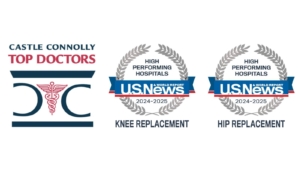Minimally Invasive Surgery
Minimally invasive surgery (MIS) represents a trend toward smaller incisions and/or less underlying soft tissue dissection. Scientists have developed new techniques and instruments and even new prostheses to accommodate smaller incisions. Patients are asking for it. Doctors are building practices around it. The media is hyping it.
But is MIS always better? The answer is: not always. Here is what the data shows. Well-designed studies published in peer-reviewed publications are not reporting that minimally invasive surgery results in better outcomes, as measured by less soft tissue trauma, less blood loss, or a faster recovery. We are also seeing more reports that MIS in the hip and knee is resulting in significantly higher complication rates. Poor component positioning in total hip and total knee surgery with MIS is more frequent.
Take this scenario, for example. We all know that obesity rates are on the rise. It is easy to imagine that a surgeon operating on an obese patient might implants the components in less than optimal positions because the surgeon is struggling through a tiny, deeper incision. One can also imagine that the surrounding tissues are being subjected to more stress and trauma to “make the small incision work,” hence there are more wound problems and infections.
We think the trend toward smaller incisions and less underlying soft tissue dissection is a good one, but it not one-size-fits-all. At the Leone Center, all patients receive as minimally invasive surgery (MIS) as possible. Our emphasis is on precise component positioning, meticulous soft tissue handling and closure. This results in less soft tissue trauma and as rapid a recovery as possible. Our goal is to relieve pain, restore the ability to walk normally and be active, and create a construct that lasts many, many years.
Choose a surgeon based on reputation, experience, and the feeling of trust and personal connection you get. Though it is important to discuss new procedures and technology, in the end, you need to trust that the surgeon you have chosen will choose what is best for you.


